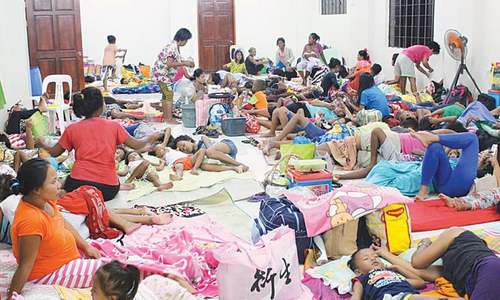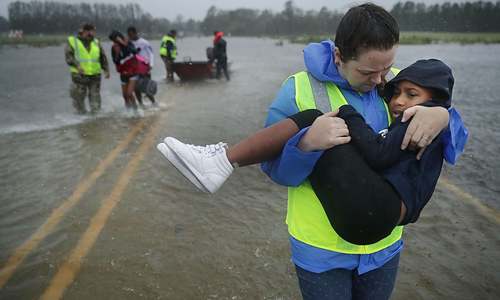Typhoon Mangkhut slammed into mainland China late Sunday after leaving a trail of destruction in Hong Kong and Macau after killing at least 59 people in the northern Philippines.
The world's biggest storm this year felled trees and sent skyscrapers swaying in high-rise Hong Kong, injuring more than 200 people there before making landfall on the coast of Jiangmen city, in southern China's Guangdong province.
Provincial authorities said they evacuated a total of 2.37 million people and ordered tens of thousands of fishing boats back to port before the arrival of what Chinese media has dubbed the “King of Storms”.
State-run China Central Television (CCTV) reported the typhoon had killed two people in Guangdong.
Mangkhut left large expanses in the north of the main Philippine island of Luzon underwater as fierce winds tore trees from the ground and rain unleashed dozens of landslides.
Hong Kong weather authorities issued their maximum alert for the storm, which hit the city with gusts of more than 230 kilometres per hour (142 mph) and left 213 people injured, according to government figures.
As the storm passed south of Hong Kong, trees were snapped in half and roads blocked, while some windows in tower blocks were smashed and skyscrapers swayed, as they are designed to do in intense gales.
The Philippines was just beginning to count the cost of the typhoon which hit northern Luzon on Saturday.
The death toll jumped to 59 on Sunday evening, police said, as more landslide victims were discovered.
Authorities said they would continue efforts in the morning to dig out a group of two dozen miners who are feared dead after their bunkhouse was hit by a landslide near the northern city of Baguio.
In the town of Baggao the typhoon demolished houses, tore off roofs and downed power lines. Some roads were cut off by landslides and many remained submerged.
Farms across northern Luzon, which produces much of the nation's rice and corn, were swamped by muddy floodwater, their crops ruined just a month before harvest.
“We're already poor and then this happened to us. We have lost hope,” 40-year-old Mary Anne Baril, whose corn and rice crops were spoilt, told AFP.
“We have no other means to survive,” she said tearfully.
Flooding in Hong Kong and Macau
An average of 20 typhoons and storms lash the Philippines each year, killing hundreds of people.
The latest victims were mostly people who died in landslides, including a family of four. In addition to those killed in the Philippines, a woman was swept out to sea in Taiwan.
In Hong Kong, waters surged in the famous Victoria Harbour and coastal fishing villages, from which hundreds of residents were evacuated to storm shelters.
Some roads were waist-deep in water with parts of the city cut off by floods and fallen trees.
In the fishing village of Tai O, where many people live in stilt houses built over the sea, some desperately tried to bail out their inundated homes.
“Floodwater is rushing into my home but I'm continuously shovelling the water out. It's a race against time,” resident Lau King-cheung told AFP by phone.
The government warned people to stay indoors but some ventured out, heading to the coast to take photos.
A couple with a child were seen by an AFP reporter taking pictures on a pier known as a popular Instagram spot as waves surged and almost submerged it.
Others stayed at home but were terrified by smashing windows in their apartments.
“The entire floor and bed are covered in glass,” one resident told local broadcaster TVB after her bedroom window shattered. “The wind is so strong.”
Almost all flights in and out of Hong Kong were cancelled. Schools in the city will be shut on Monday.
In the neighbouring gambling enclave of Macau, all 42 casinos shut down for the first time in its history.
As the storm moved past Macau, streets became submerged under water gushing in from the harbour.
Emergency workers navigated the roads on jet-skis and dinghies, rescuing trapped residents.
The government and casinos are taking extra precautions after Macau was battered by Typhoon Hato last year, which left 12 dead.














































